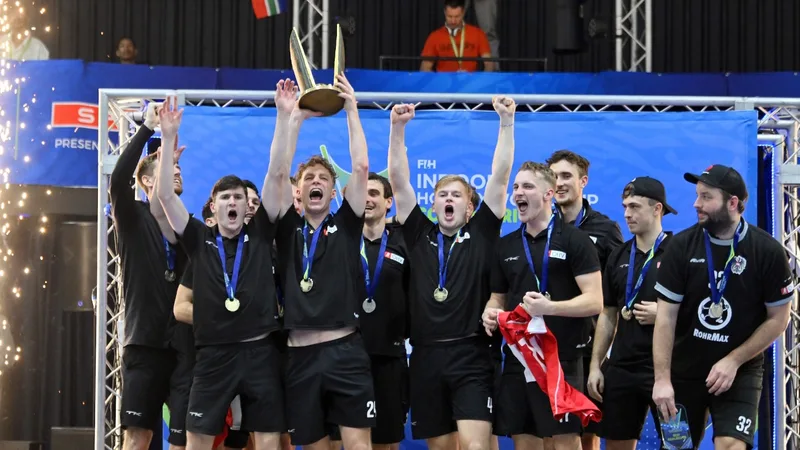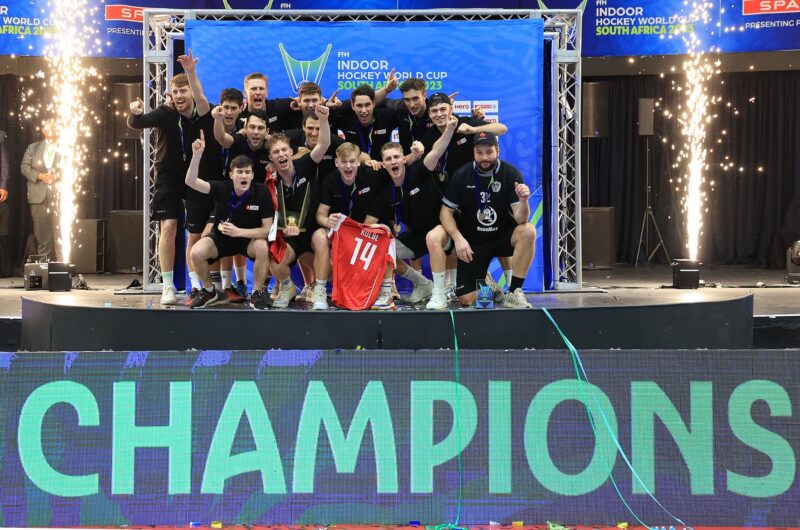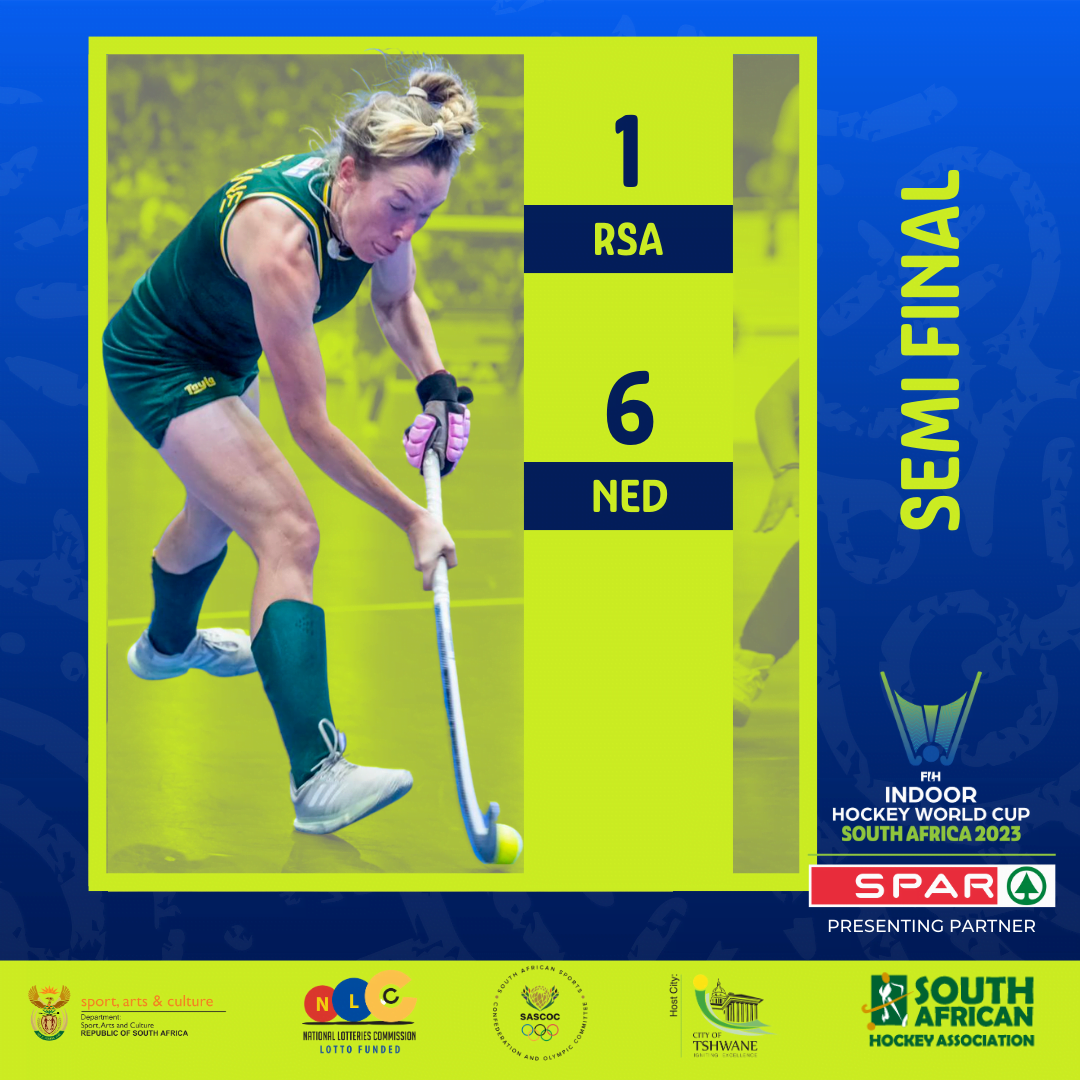ACCC [33 M – 24 W] DAY 3 MATCH RESULTS: 15 FEBRUARY 2023




14 February 2023 Lausanne, Switzerland: The FIH Indoor Hockey World Cup South Africa 2023 came to a conclusion earlier this week as Austria men won a second world cup title in a row, while Netherlands women won their third title, equalling Germany’s record for most indoor hockey world championships in the women’s competition. There were plenty of surprises throughout the world cup as the unpredictable nature of indoor hockey shone through, which have led to shake-up in the indoor hockey world rankings. In the men’s world rankings Austria (2450) retain the top spot in the rankings building on the 2018 world cup victory by winning a second straight title and building a big lead on the second place, which is occupied by Netherlands (1700), who were silver medalists at the recently concluded World Cup. Iran (1650) won their second straight bronze medal at the world cups and sit just 50 points behind Netherlands in third place. Belgium (1550) who narrowly missed out on the semi-finals spot in the World Cup stay 4th in the world rankings overtaking Czech Republic (1388) who finished in the 9th position that drops them from the 4th spot that they held before the start for the World Cup. United States (982) two previous campaigns at the world cup had both ended in 11th place finishes, but they were fantastic in the 2023 edition finishing fourth and climbing up eleven spots to the 8th place in the world rankings. South Africa (1188) who lost to Netherlands in an entertaining quarterfinal contest, climbed four places to 7th in world ranking. Argentina (900) who finished 7th in their debut World Cup are also big gainers moving from their pre-tournament rank of 20th all the way up to 10th. New Zealand (300) who were unranked before the event made their debut at the world cup and make their first appearance on the world rankings in 23rd place. To see the complete men’s FIH Indoor Hockey World Rankings, please click here. In the women’s world rankings Netherlands (2350) who won their third indoor hockey world title leapfrog Germany who pulled out of the World Cup to claim the top spot in the rankings. Austria (1525) registered their best ever finish at the world cups claiming the silver medal and moved up three places to 4th in the world. Czech Republic (1813) claimed their second bronze medal at the world cups and moved up to 2nd in world ranking, ahead of Ukraine (1750) who retained their 3rd position in the world rankings. South Africa (1210) had a stellar tournament narrowly missing out on the podium, but the fourth-place finish in the World Cup was enough to lift them up eight spots from 14th to 6th in the world rankings, ahead of Belgium (1188) in 7th who moved up six spots. The young USA (1075) team made a splash in the World Cup and move up four spots to 8th in the world. Canada (903) qualified for the quarterfinals in the world cups for the first time in their history and move up five spots to 11th in the world rankings. New Zealand (350) who were unranked before the event made their debut at the world cup and make their first appearance on the world rankings in 21st place. To see the complete women’s FIH Indoor Hockey World Rankings, please click here. For more information about FIH and hockey in general, please consult FIH.hockey, follow the FIH social media channels – Facebook, Instagram and Twitter – and download the Watch.Hockey app.

14 February 2023 Lausanne, Switzerland: After a thorough analysis, the South African Hockey Association has decided not to join the FIH Hockey Men’s Pro League for the next season, despite having qualified for it, thanks to winning the inaugural FIH Hockey Nations Cup played on its own soil, in Potchefstroom, last year. However, the South African Hockey Association has confirmed its firm intention to join the League – ‘Hockey at its Best’ – in the future, provided their teams, women or men, qualify for it on the field of play, of course. Consequently, the runners-up of the Nations Cup, Ireland, have been invited by the International Hockey Federation (FIH) to join the FIH Hockey Pro League in 2023-24, and the “Green Machine” – Ireland’s men’s team nickname – have accepted to do so. Commenting on the announcement, Hockey Ireland CEO Ronan Murphy said : “This announcement comes at a very exciting time for Hockey Ireland as we look to grow participation in the game and compete at the highest level on the international stage. The fact that our Senior Men are now competing in World Hockey’s Pro League against eight top Hockey teams from around the world is a testament to all the hard work to date. It’s a very busy year ahead for the team and the EuroHockey Championships in Abbotstown in July will be the perfect opportunity for fans to come along and watch them in full international action.” Mark Tumilty, Ireland Men’s Head Coach can’t wait to get started in the FIH Hockey Pro League: “We are delighted this has come about. It’s a big opportunity for us and for men’s hockey in Ireland. It’s a massive challenge for us but I’ve said many times before that for Ireland to move forward in world hockey we need to be playing competitive games against the top nations. To have to chance now to play sixteen games against the top countries in the world gives us that opportunity to develop. It’s what we need and it’s a big carrot for the players.” “The SA Hockey Association (SAHA) is extremely saddened by the fact that they will not be attending the FIH Hockey Pro League season (2023-2024) despite us qualifying at the inaugural Men’s Nations Cup. The magnificent progress in our team performance is a direct result of our participation in the previous Pro League season. As a federation we will forever be grateful for the opportunity afforded to us to participate at that level. It will be sorely missed especially as it would have assisted our team with their preparation for Paris 2024. We wish Hockey Ireland and all the other teams all the very best for the FIH Hockey Pro League season (2023-2024)”, SAHA interim CEO Shaune Baaitjies commented. “Whilst we will miss South Africa in the next season, we know that the South African Hockey Association firmly intends to join the FIH Hockey Pro League as soon as possible. Therefore, this is just a matter of time. Meanwhile, we’re absolutely delighted to welcome the Irish men’s team and we can’t wait to see them perform in the League next season!”, FIH CEO Thierry Weil said. The upcoming FIH Hockey Pro League season (2023-24) will be the first one applying the “promotion and relegation” principle. In concrete terms, the winners of the inaugural FIH Hockey Nations Cup played in 2022 (India for women, South Africa – now replaced by Ireland – for men) have been promoted. Both teams will take the place of the teams relegated (one women’s team and one men’s team) at the end of the current season. Keep up to date with all the latest news on the FIH Hockey Pro League via the Watch.Hockey app, event website and through FIH social media channels – Facebook, Instagram and Twitter. In territories where broadcast rights agreements are not in place, fans can watch live match action from the FIH Hockey Pro League via the Watch.Hockey app. #FIHProLeague #HockeyInvites #HockeyEquals


The week-long event slated for February 13-19 will be played at the City Park Stadium and the Dashmesh Hockey Stadium along Forest Road In Summary • 12 men’s teams have been placed in pools A and B while the same number of pools will accommodate the 10 teams in the women category. • The Kenyan pair of Butali Warriors and Kenya Police headline Group B. Kenya Hockey Union (KHU) chairman Nashon Randiek says they are on course for the annual African Cup for Club Championship in Nairobi despite a few challenges. The week-long event slated for February 13-19 will be played at the City Park Stadium and the Dashmesh Hockey Stadium along Forest Road, according to the fixtures released yesterday. Kenya was picked to host the event after Malawi and South Africa pulled out due to personal reasons. “We accepted to host the event on short notice after a request from Africa Hockey. However, we haven’t approached the government for support since it wasn’t projected in our budget,” said Randiek. Twelve men’s teams have been placed in pools A’ and ‘B’ while the same number of pools will accommodate the 10 teams in the women’s category. Sharkia, Zamalek (Egypt); Ghana’s Exchequers and GRA and the Nigerian duo of Kada Stars and Police Machine, are in the men’s Group A. The Kenyan pair of Butali Warriors and Kenya Police headline Group B. They are joined by Weatherhead and Wananchi both from Uganda, Tanzania’s Moshi Khalsa, and Hippo from Zimbabwe. Police will be seeking to go one step better after finishing second in 2016 when the competition was last held in Kenya. Captain Victor Wekesa observed: “We are going for nothing short of winning the title. The players are psyched up. We’ve put a turbulent season behind us after injuries affected our performance. Only Govan Mbeli is a major doubt because of the thigh injury otherwise we have a fully fit squad.” In the women’s category, Army Ladies and GRA highlight Pool ‘A’ alongside Delta Queens, Kada Queens and Sharkia. The trio of Strathmore Scorpions, Lakers, and Blazers will carry the Kenyan flag in Pool B. Uganda’s Deliverance Church and Wananchi complete the group of death. Fresh from winning the national women’s league title last month, expectations are high for Scorpions if captain Jeriah Onsare is to be believed. “All eyes will be on us after the title triumph but I am hopeful we won’t disappoint. This is my first major assignment with Scorpions and I can’t wait to get started.” Wazalendo were the only team to grace the occasion last year. Source: the-star.co.ke | February 10, 2023


Pretoria, South Africa: After 80 matches and seven days of rousing action, Austria’s men successfully defended their world title while the Netherlands regained the women’s crown as the FIH Indoor Hockey World Cup came to a gripping end in Pretoria, South Africa. Michael Körper got the defending champions off to a great start in the men’s final, putting his side ahead in the ninth minute. Less than a minute later the Dutch struck back, Max Sweering slotting one in off a penalty stroke for the equaliser just before the first break. But it didn’t take long for the Austrians to regain their lead, Körper once again adding his name to the scoresheet with a magnificent, lifted effort. The Dutch once again came back at them though, to level matters before halftime. The Netherlands then led twice in the second half, but the prolific Körper completed his hattrick to once again draw level at 4-4, sending the title decider to a shootout, which the Austrians edged 3-2 for a memorable victory. “Unbelievable, unbelievable,” said the elated Austrian captain, Leon Thörnblom. “You tend to say a lot but when you do it, it’s just a different feeling. I have no words, I can’t explain it… just unbelievable. I’m so happy.” Dutch coach Robert Tigges was proud of his team’s performance. “What can I say? Tough luck, it was so super-close… During the game it looked like we were the better team and I think we created more chances, but we know they have a solid squad and it’s hard to score goals against them. But I’m very proud of my team. I think we played a great tournament.” While the Austrian men were crowned world champions for a second time, the women were seeking a first-ever world title when they also took on the Netherlands in their final. But the Dutch were in rampant mood in what turned into a completely one-sided match. Mabel Brands scored a hattrick as the Dutch romped to a third world title with a 7-0 victory. With that, they also climbed to the top spot in the world rankings while Austria moved up from seventh to fourth. “I’m so proud. We did a really good job, we prepared well and we executed it,” said Brands. As for scoring a hattrick in a World Cup final, she added: “It’s special, really special – I will never forget it.” In a first for a Hockey World Cup, both the men’s and women’s finals featured one male and one female umpire in each. Meanwhile, the women’s third-place playoff saw hosts South Africa taking on the Czech Republic. Having dropped from third at the 2015 World Cup to seventh in 2018, the Czechs were determined to make a return to the podium and they put in the ideal performance to do just that. Adela Lehovcova scored a brace and Anna Kolarova added another before the home side could breach the Austrian defence. Tegan Fourie’s consolation goal in the 26thminute was not enough to prevent the 1-3 loss for the South Africans, who nevertheless achieved their highest-ever World Cup finish with fourth place. Their unprecedented progress also saw them climbing up the world rankings from 12th place to sixth. “We’ve done a very good job in this tournament,” said Czech captain Katerina Lacina. “The wins we had during the tournament are a big step forwards. I think we can be proud of what we achieved.” The men’s bronze medal match between Iran and the USA produced another fast-paced showdown which included several spectacular goals. It was all square on 4-4 by the final hooter after Aki Kaeppeler found the final equaliser in the 37th minute. Just like they did in their quarterfinal match, the Iranians clinched the win in the shootout to match their bronze medal-winning performance from the last FIH Indoor Hockey World Cup in 2018. “We did a lot of training for shootouts because we knew we could be in that position in many matches. The USA is a very strong team… but slowly by slowly we could manage the game,” said Iranian captain Behdad Beiranvand, before embracing and swapping shirts with an emotional US captain Pat Harris. “I think we surprised a lot of people. I just feel bad that we couldn’t make it happen. It’s just been a massive journey for the whole team,” said Harris. “I’m proud of the group and the way we played in the semifinal and even in this third-place game, we should still hold our heads high and we can go home with a good feeling.” As a result of their efforts, the Americans have taken a massive leap in the world rankings, up from 24th to eighth place. 11 February 2023 Results Result: Match 35 – men New Zealand 2 – 7 Australia Player of the match: Ben Staines (AUS) Umpires: Diego Barbas (ARG), Celine Martin-Schmets (BEL) Result: Match 36 – men Austria 8 – 3 Iran Player of the match: Fabian Unterkircher (AUT) Umpires: Lee Barron (ENG), Adam Barry (AUS) Result: Match 37 – men Netherlands 7 – 3 USA Player of the match: Nicki Leijs Umpires: Sean Edwards (ENG), Andres Ortiz (ESP) Result: Match 38 – women Austria 1 – 0 Czech Republic Player of the match: Marianne Pulter (AUT) Umpires: Sophie Bockelmann (GER), Celine Martin-Schmets (BEL) Result: Match 37 – women Netherlands 6 – 1 South Africa Player of the match: Lieke van Wijk (NED) Umpires: Melina Illanes (ARG), Rachel Williams (ENG) Result: Match 38 – men Kazakhstan 2 – 5 Czech Republic Player of the match: Lukas Plochy (CZE) Umpires: Ayden Shrives (RSA), Lukasz Zwierzchowski (POL) Result: Match 39 – men Iran 4 (3) – 4 (2) USA Player of the match: Reza Norouzzadeh (IRI) Umpires: Lee Barron (ENG), Adam Barry (AUS) Result: Match 39 – women South Africa 1 – 3 Czech Republic Player of the match: Barbora Cechakova (CZE) Umpires: Melina Illanes (ARG), Emily Carroll (AUS) Result: Match 40

24 teams representing 14 countries ventured to the southern tip of Africa, to a country renowned for its collection of wildlife. In the wild it is the strongest that survive and are ultimately the king of the bush. The Indoor hockey World Cup, presented by SPAR, was no different as the Austrian Men and Netherlands Women become the undisputed kings and queens of the court and more importantly the world. The Austrian men had entered the tournament as favourites on the back of their European Championship title and cantered their way to the final. The unstoppable force though met an immovable object in the Dutch and an incredible final could not be separated until a penalty shootout decided the game with the Austrians defending their crown and remaining the undisputed champs of Indoor Hockey. The Dutch women also arrived as the favourites in the absence of Germany, and they embraced it winning 8 out of 8 games in a sprint to the title. Donja Zwinkels inspired her country with performances that ranged from sublime to extraordinary as the Netherlands collected their third FIH Indoor Hockey World Cup. The SPAR South African women captivated the nation in their march to the semi-finals. Although they were unable to win the bronze medal, they most definitely did win the hearts of the South African sporting family as their performance was one that was unprecedented by an African nation. The SA Hockey Men, powered by Tops at SPAR, were arguably the most exciting team in the tournament. They played with purpose and confidence led by Jethro Eustice and Justin Domleo, while the Cassiem brothers along with Ryan Julius give the team a flair that is second to none. The sixth indoor hockey world cup came, it saw, and it was conquered. And incredible event that may well and truly inspire the future generations and leave a legacy that will live long in the memory of African Hockey. It was an incredible FIH Indoor Hockey Cup. The African sun has now set on what will forever be remembered fondly. Here are the final standings from the FIH Indoor Hockey World Cup 2023 #IHWC2023 pic.twitter.com/2EaWHjiE4E — SA Hockey (@SA_Hockey) February 12, 2023 The tournament award winners were: Best men’s junior player: Mustapha Cassiem (South Africa) Best women’s junior player: Reese D’Ariano (United States of America) Best men’s goalkeeper: Mateusz Szymczyk (Austria) Best women’s goalkeeper: Barbora Chechakova (Czech Republic) Men’s top goal-scorer: Michael Korper (Austria) Women’s top goal-scorer: Donja Zwinkels (Netherlands) Men’s player of the tournament: Fabian Unterkircher (Austria) Women’s player of the tournament: Donja Zwinkels (Netherlands) Source: SAHockey.co.za | February 12, 2023

The SPAR South African Indoor Hockey side had captivated their fans throughout the FIH Indoor Hockey World Cup in a march to the semi-finals. They had a packed crowd at the Hearfelt Arena in their corner as they sought to sink the unsinkable ship in the Netherlands. The South African women had returned to the World Cup having missed the 2018 edition and have shown the journey they have been on has been an incredible journey full of heart, courage and inspiration. The juggernaut that is the Dutch though was near impossible to stop and they rocked their way to an early lead. Pam Imhof and a stroke from Lieke van Wijk earned the team a credible 2-0 lead. Showing characteristic South African fight the hosts pulled a goal back through a superbly taken penalty corner from Danny de Oliviera. They were being spurred on by an incredible performance in goals by Cheree Greyvenstein The Dutch though continued to show their class and extended their lead to three goals with Donja Zwinkels scoring before another stroke stretched the lead. South Africa pulled their keeper and continued to fight for a result but conceded two late goals to inflate the result. The team would not have long to lick their wounds as the bronze medal match takes place at 18:30 against a wounded Czech Republic. Source: SAHockey.co.za | February 11, 2023